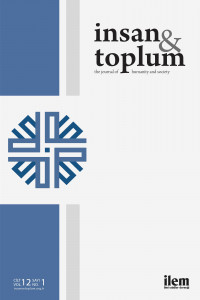Öz
Toplum birbirinden farklı taleplere, çıkarlara ve hayat tarzlarına sahip çeşitli gruplardan oluşmaktadır. Demokrasinin her birine eşit şartlar sağlama amacına rağmen, gruplar arasındaki güç ilişkileri toplumda çeşitli eşitlik ve adalet sorunlarına sebep olmakta ve bu durum, bazı hayat tarzlarının sosyal değerinin azalmasına yol açmaktadır. Bu bağlamda, tanınma siyaseti ve popülizm toplumun dezavantajlı kesimlerinin sorunlarını çözmek üzere ortaya çıkmış iki siyaset biçimidir. Popülizm, kimliklerin sınırlarını, önemlerini ve statülerini tanımlama imkanına işaret eden yapısal toplumsal iktidara sahip olma eşitsizliğine isyan ederek, kendisini, tanınma taleplerine önemli bir çözüm olarak sunmaktadır. Fakat, aynı zamanda, halk ve elit arasında yaptığı antagonistik ayrım ile tanınma siyaseti için esas olan diyalog, müzakere ve tartışma gibi ihtiyaçları dışlamaktadır. Bu durum, popülizmin, tanınma mücadeleleri için sorun oluşturan temsil anlayışına ve yoksayılma duygularını işlevselleştirme yöntemine de yansımaktadır. Bu çalışma, popülizmi, tanınma taleplerini kullanarak toplumdaki güç eşitsizliğini dengelemeyi değil, bu dengesizliğin yönünü değiştirmeyi amaçlayan ve tanınma siyaseti için yanlış bir cevap olan bir siyaset biçimi olarak tartışmaktadır.
Anahtar Kelimeler
Tanınma siyaseti popülizm kimlik tanınmama yapısal toplumsal iktidar.
Kaynakça
- Abts, K., & Rummens, S. (2007). Populism versus democracy. Political Studies, 55(2), 405–424. https://doi. org/10.1111/j.1467-9248.2007.00657.x
- Brubaker, R. (2017). Why populism? Theory and Society, 46(5), 357–385. https://doi.org/10.1007/s11186- 017-9301-7
- Canovan, M. (1999). Trust the people! Populism and the two faces of democracy. Political Studies, 47(1), 2–16. https://doi.org/10.1111/1467-9248.00184
- Canovan, M. (2002). Taking politics to the people: Populism as the ideology of democracy. In Democracies and the Populist Challenge (pp. 25–44). https://doi.org/10.1057/9781403920072_2
Öz
Society consists of several different groups possessing unique demands, interests, and lifestyles. The power relations among these groups tend to result in inequalities and injustices, causing certain ways of life to degrade despite democracy’s ultimate aim of providing equal opportunities for all. The politics of recognition and populism arrive in this context as two forms of politics aiming to fix the problems found in the disadvantaged sections of society. By revolting against society’s asymmetrical relations in the constructive social power that brings with it the ability to define the boundaries, relevance, and status of identities, populism presents itself as a significant solution to the claims of recognition. Nevertheless, populism excludes the essential requirements of the politics of recognition such as dialogue, negotiation, and discussion through its antagonistic distinction between the people and the elite. Populism also reflects on its problematic understanding of representation with regard to struggles for recognition and its instrumentalization of feelings of misrecognition. This paper offers a view of populism as a false response to the politics of recognition that uses demands for recognition to shift but not balance the power asymmetry in society.
Anahtar Kelimeler
Politics of recognition populism identity misrecognition constructive social power.
Kaynakça
- Abts, K., & Rummens, S. (2007). Populism versus democracy. Political Studies, 55(2), 405–424. https://doi. org/10.1111/j.1467-9248.2007.00657.x
- Brubaker, R. (2017). Why populism? Theory and Society, 46(5), 357–385. https://doi.org/10.1007/s11186- 017-9301-7
- Canovan, M. (1999). Trust the people! Populism and the two faces of democracy. Political Studies, 47(1), 2–16. https://doi.org/10.1111/1467-9248.00184
- Canovan, M. (2002). Taking politics to the people: Populism as the ideology of democracy. In Democracies and the Populist Challenge (pp. 25–44). https://doi.org/10.1057/9781403920072_2
Ayrıntılar
| Birincil Dil | Türkçe |
|---|---|
| Konular | Siyaset Bilimi |
| Bölüm | Araştırma Makaleleri |
| Yazarlar | |
| Yayımlanma Tarihi | 22 Mart 2022 |
| Yayımlandığı Sayı | Yıl 2022 Cilt: 12 Sayı: 1 |

